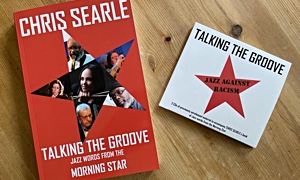Home » Jazz Articles » Book Review » The Best Music Writing 2009
The Best Music Writing 2009
 The Best Music Writing 2009
The Best Music Writing 2009 Greil Marcus, Guest Editor; Daphne Carr, Series Editor
Trade Paperback; 384 pages
ISBN: 0306817829
Da Capo Press
2009
What are the goals of good music writing? At the very least, it should educate the reader about the music and integrate that information into a perspective encompassing the surrounding music, art and history. Tall order though it is, the best music writing provides the reader these services. But there is further, an over-riding aim of these two goals. The best music writing encourages further reading and/or listening.
The Best Music Writing 2009 has several examples achieving these goals. The series, published by Da Capo Press, was inaugurated in 2000 with guest editor Peter Guralnick and series editor Douglas Wolk. Since then, guest editors have included Robert Christgau, Nick Hornby and Matt Groening. The breadth of music has been covered, from old timey blues to the newest hip hop; from classical music to free jazz.
The 2009 edition is edited by Greil Marcus, whose book Mystery Train: Images of America in Rock n' Roll Music (E.P. Dutton, 1975) remains a touchstone in rock criticism. Marcus has chosen a wide swath of writing for his edition, the majority of which successfully educates and integrates, building that higher musical perspective that increases the satisfaction of the listening experience.
Alto saxophonist Art Pepper once said, "Never open a show with a ballad." Marcus takes this to heart by kicking things off here with Aidin Vaziri's review of Guns n' Roses' long awaited Chinese Democracy (Geffen, 2008) in The San Francisco Chronicle. Vaziri educates and integrates and stimulates further listening, just not of Chinese Democracy. He opens his article with, "Axl Rose is an idiot..." writes 200 words about every other major disc released the same day as Democracy, and ends with, "Finally, Guns N' Roses, Chinese Democracy: it's a bit overproduced, isn't it?" the writing is tight and to the point.
That was liberating. What Vaziri's taut writing enables is an emergence from the 1980s' somnolence with the admission that Appetite for Destruction (Geffen, 1987) might be the last great rock album and the realization that Use Your Illusion (Geffen, 1991) is a bloated, overrated carcass and "November Rain" a pretentious mosquito bite turned malignant.
David Ramsey's "I Will Forever Remain Faithful: How Lil Wayne helped me survive my first year teaching in New Orleans" draws a blade across the event of Dwayne Michael Carter, III (aka Lil Wayne} and Hurricane Katrina, exposing the conceptions and misconceptions of both, sending the reader online looking for mixtapes. He does all of this in Harper's of all places.
In "Unknown Bards: The blues becomes transparent about itself," (the most important inclusion in the collection) John Jeremiah Sullivan hits a grand slam in the departments of encouraging more reading and listening by reviewing two important books on blues music: Elijah Wald's Escaping the Delta: Robert Johnson and the Invention of the Blues (Amistad, 2004) and Marybeth Hamilton's In Search of the Blues (Basic Books, 2008).
These two books are important in blues scholarship for sharpening the focus of the intent of the musicians making "race records" between 1920 and 1940, and correctly noting that the "blues" designation is largely a white construct resulting from the folk revival and scholarship of the early 1960s. With this early scholarship came the same "worship of old ruins" romanticism that compelled Wordsworth to pen "Lines written a few miles above Tintern Abbey." Wald, Hamilton and later Gioia in Delta Blues have turned their scholarship toward the broader perspective of the blues artists' place among the African-American community and a study of the history and methods of blues scholarship during the revival of the early 1960s.
Vanessa Grigoriadis pegs Britney Spears as the female Elvis Presley of her generation, in "The Tragedy of Britney Spears" published in Rolling Stone. Grigoriadis' Spears is revealed as a selfish blackhole traveling at light speed down the road of self destruction, the sooner the better. Yuval Taylor celebrates the pungent statement of Funkadelic's Maggot Brain (Westbound, 1971) in "Funk's Deathtrip" published in PopMatters. Eddie Hazel's guitar orgy on the title cut is still gripping, justifying all of the contemporary hullabaloo surrounding Funkadelic's leader, George Clinton.
Barry Gifford proves that brevity is indeed the soul of wit in "Hey Ludwig, Grab Yourself a Pigfoot" from Jacket, where he compares Beethoven's Piano Sonata No. 31 with pianist Thelonious Monk's "Functional." And what a hoot that is. James Parker pisses on the grave of muck-racker Albert Goldman and in the eye of Axl Rose in "Unauthorized!: Axl Rose, Albert Goldman, and the Renegade Art of Rock Biography," originally published in the Boston Phoenix. Great fun was had by all. Now where is that copy of Elvis (McGraw Hill, 1981), anyway?
Comments
Tags
For the Love of Jazz
 All About Jazz has been a pillar of jazz since 1995, championing it as an art form and, more importantly, supporting the musicians who create it. Our enduring commitment has made "AAJ" one of the most culturally important websites of its kind, read by hundreds of thousands of fans, musicians and industry figures every month.
All About Jazz has been a pillar of jazz since 1995, championing it as an art form and, more importantly, supporting the musicians who create it. Our enduring commitment has made "AAJ" one of the most culturally important websites of its kind, read by hundreds of thousands of fans, musicians and industry figures every month.






















